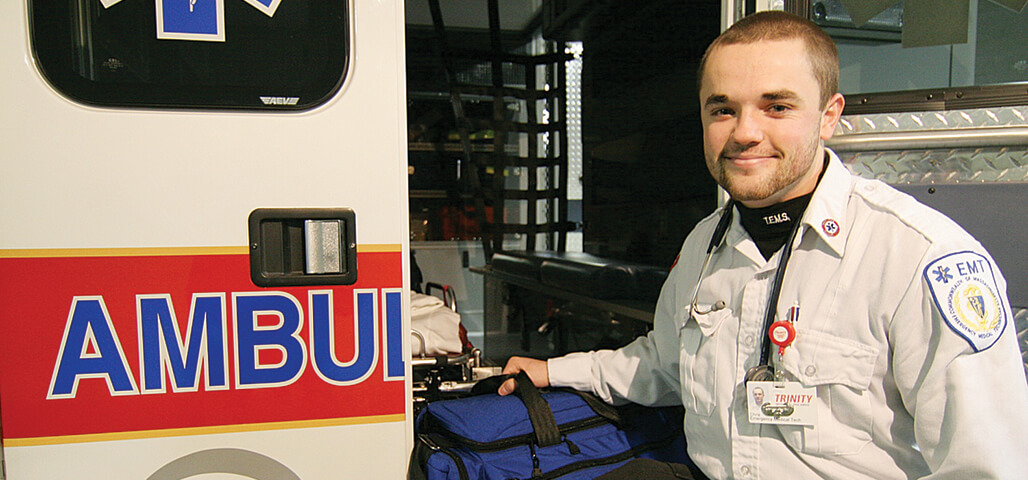
If you are good in a crisis – calm, level headed, and capable of making good decisions quickly – you will thrive as paramedic. NECC’s program will teach you how to provide immediate treatment to people in need, and transport them quickly to clinics, hospitals, and other emergency care centers.
Why Choose NECC?
NECC’s Paramedic Program meets the requirements of the Massachusetts Department of Public Health and the national guidelines for paramedic education. The goal of the program is to prepare competent entry-level Paramedics in the cognitive (knowledge), psychomotor (skills), and affective (behavior) learning domains with or without exit points at the Advanced Emergency Medical Technician and/or Emergency Medical Technician, and/or Emergency Medical Responder levels. With this program you will:
- Learn about human anatomy, physiology, trauma response, and interventions
- Gain hands-on experience with equipment commonly used by paramedics
- Benefit from supervised experiences in clinical care settings
- Sharpen your decision-making and patient care skills
- Prepare for a career that is emotionally and financially rewarding
Because of NECC
You will graduate as a competent paramedic ready to work in a variety of settings. Upon completion of the program you can:
- Sit for the National Registry of Emergency Medical Technicians exam
- Work for ambulance companies, fire departments, or emergency rooms
- Transfer earned credits to a bachelor’s degree in a related health program at a public or private four-year school, saving thousands of dollars on your degree
Quote:
I immediately thought it was great. It is an adrenal rush. I like having the opportunity to provide assistance to people.”
Seth Rohrer
Courses and Requirements
Skip Required Courses and Program Notes
Program Pathway
A pathway is the most efficient sequence of courses semester-to-semester recommended for students to complete their degree. View the suggested pathway for the Paramedic Technology Associate Degree.
Career Paths & Job Market
Job Opportunities
Job Opportunities
The broad based skills of the program provide a foundation for a wide range of professional pursuits. See the Bureau of Labor Statistics for job details, market trends, and salary ranges.
Career Paths
Career Paths
Graduates who choose to directly enter the workforce can find employment in:
- Private ambulance services
- Fire departments
- Emergency Medical Services (EMS) or hospitals
- Various other industries that provide emergency services
Contact
Program Coordinator
Program Coordinator
David J. Weber, Esq., NRP, FP-C
Phone: 978-665-5873
Email: dweber@necc.mass.edu
Office LC303
Clinical Coordinator
Clinical Coordinator
Edward Flanagan, MFA, NR-P, FP-C
Office: LC-303
Phone: 978-655-5872
Email: eflanagan@necc.mass.edu
Additional Information
Accreditation Agency
Accreditation Agency
The NECC Paramedic Technology Program is Accredited by the Commission on Accreditation of Allied Health Education Programs (caahep) upon the recommendation of the Committee on Accreditation of Educational Programs for the Emergency Medical Services Professions (CoAEMSP). Commission on Accreditation of Allied Health Education Programs 1361 Park Street Clearwater, FL 33756 727-210-2350 CAAHEP website To contact CoAEMSP: 8301 Lakeview Parkway Suite 111-312 Rowlett, TX 75088 Phone: (214) 703-8445 Fax: (214) 703-8992 COAEMSP website
Outcomes and Associated Information
Outcomes and Associated Information
The most current CoAEMSP Annual Report was for the calendar year 2021.
National Registry of Emergency Medical technicians Examinations
Employment of Successful Candidates
| Year |
|
Number of Students |
Percentage Passed |
| 2022 |
Cumulative Practical Exam Attempts |
7 |
100% |
| |
Cumulative Written Exam Attempts |
7 |
86% |
| |
Employment of Certified Candidates |
7 |
100% |
| 2021 |
Cumulative Practical Exam Attempts |
6 |
100% |
| |
Cumulative Written Exam Attempts |
6 |
84% |
| |
Employment of Certified Candidates |
7 |
100% |
| 2020 |
Cumulative Practical Exam Attempts |
8 |
100% |
| |
Cumulative Written Exam Attempts |
8 |
100% |
| |
Employment of Certified Candidates |
8 |
100% |
| 2019 |
Cumulative Practical Exam Attempts |
10 |
90% |
| |
Cumulative Written Exam Attempts |
10 |
75% |
| |
Employment of Certified Candidates |
9 |
100% |
Successful Credentialing Four Year Running Total
Retention data
From 1/1/2019 thru to 12/31/2022 a total of thirty-two (32) graduates sought certification with twenty-eight (28) obtaining NREMT-Paramedic status. (87.5%) Class Cohort 2020-2021 Retention: 84.6%
Required Documents
Criteria Packets Technical Standards CORI/CHRI/SORI



